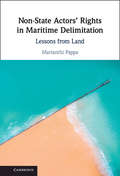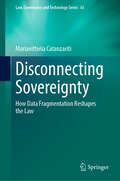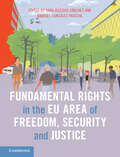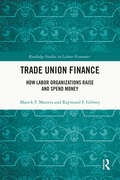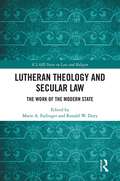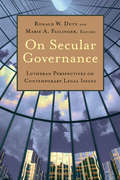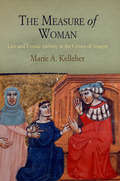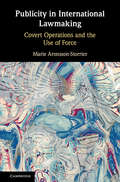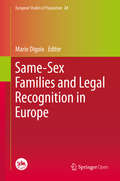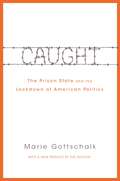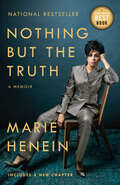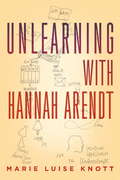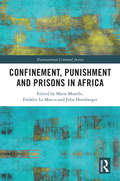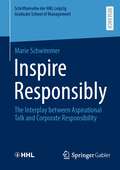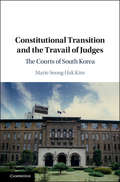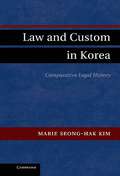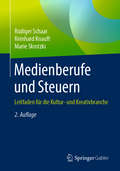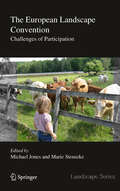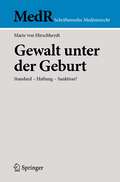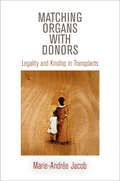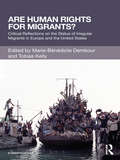- Table View
- List View
Non-State Actors' Rights in Maritime Delimitation: Lessons from Land
by Marianthi PappaMost of the world's maritime boundary disputes involve privately held rights - relating to such matters as fishing, petroleum exploration and scientific research - that states have unilaterally granted to non-state actors in areas of overlapping national claims. An international lawyer would typically investigate the legality of a state's decision to create such rights without notifying or consulting its neighbour, and the legal consequences this action would have for the interests of the states concerned. Departing from this approach, Dr Marianthi Pappa examines such situations from the perspective of the non-state actors: what will happen to private rights in a disputed maritime area if it changes hands from state A to state B due to a subsequent delimitation treaty or judgment? Does the legal framework of maritime delimitation protect those rights effectively against a potential reallocation? To address these questions, the book considers the place that private rights have in land boundary-making.
Disconnecting Sovereignty: How Data Fragmentation Reshapes the Law (Law, Governance and Technology Series #65)
by Mariavittoria CatanzaritiThis book explores the dynamic legal semantics of territory as applied to data. It offers a theoretical assessment of the legal challenges that data flows pose for the principle of territoriality and for state sovereignty more generally. The concept of sovereignty has traditionally developed in close connection with the exercise of powers over a territory, and ideas of jurisdiction have always been based on the principle of territoriality. Digitalization questions however the very idea of physical frontiers. Interconnected networks make data in effect borderless. Data can in fact be created, stored, processed, and accessed anytime and from anywhere. The idea of the book is upbeat: the law can keep pace with the ability of data to fragment reality. The condition for this is that sovereignty disconnects from territory. Disconnection is not getting rid of the territory once and for all, it only means that for data alternatives to the territorial connection exist. The analysis focuses on data from a holistic perspective (personal and nonpersonal) with the aim of investigating divergent and convergent solutions provided by different branches of the law (data protection, IP law, international law, and fundamental rights protection). It assesses in particular, the relationships between digitalization and the principle of territoriality, focusing on the specific legal aspects: the connections between law and territory; the impact of digitalization on state sovereignty; the use of extraterritoriality to circumvent territorial limitations on data flows; the rise of digital jurisdiction and its challenges; the interplay between digital jurisdiction and state sovereignty, and the alternative technological and legal solutions to data localization.
Fundamental Rights in the EU Area of Freedom, Security and Justice
by Sara Iglesias Sánchez Maribel González PascualThe development of the Area of Freedom, Security and Justice has transformed the European Union and placed fundamental rights at the core of EU integration and its principles of mutual recognition and trust. The impact of the AFSJ in the development of an EU standard of fundamental rights, which has come to the fore since the Treaty of Lisbon, is a topic of great theoretical and practical importance. This is the first systematic academic study of the AFSJ and its implications from the point of view of fundamental rights. The contributions to this collection examine the normative and jurisprudential development of the AFSJ in order to assess its effects on the overall construction of the scope and standards of protection of EU fundamental rights in this particularly complex and sensitive field of integration. The expert contributors systematically map and critically assess this area of EU law, together with the relevant case-law.
Trade Union Finance: How Labor Organizations Raise and Spend Money (Routledge Studies in Labour Economics)
by Marick F. Masters Raymond GibneyThere are few contemporary studies on the finances of unions. Indeed, little research exists on the internal operations of unions in the U.S. This book provides a comprehensive analysis of the financial resources and performance of the largest national unions. It discusses the theoretical and practical relevance of the topic, which goes directly to the formation, maintenance, and potential advancement of labor organizations. Financial capacity and performance create incentives for unions to mobilize at the grassroots level and launch major drives to improve their position in society. Understanding how unions raise and spend money provides insight as to their administrative orientation and organizational capacity. Given its topical breadth and depth, the book stands apart from the extant literature on unions in society. It is unique in the range of financial information presented, how data are analyzed, and its treatment of such important matters as compensation and benefits; operating budgets; political activism as measured by expenditures from treasury-based funds and political mechanisms funded by members through voluntary donations. The authors show not only the scope of union financial wherewithal and how it varies across labor organizations but also how such indicators compare to corporate entities who employ the rank-and-file. The book provides a wealth of information on how to analyze the finances of unions and to use this information to prepare for collective bargaining and other aspects of labor-management relations. It informs employers and other observers about how unions are able to represent members and their ability to withstand strikes.
Lutheran Theology and Secular Law: The Work of the Modern State (ICLARS Series on Law and Religion)
by Ronald W. Duty Marie A. FailingerThis collection brings together lawyers and theologians in the U.S. and Europe to reflect on Lutheran understandings of the political use of the law by secular governments. The book furthers the intellectual conversation about how Lutheran insights can be used to develop jurisprudence and specific solutions to legal issues in which there is strong conflict. It presents the basic theological and interpretive assumptions of the Lutheran tradition as they may inform the creation of legislation and judicial interpretation at local, national and international levels. The authors explore Luther’s conception of the foundations of modern secular law and understanding of vocation. The work discusses the application of Lutheran theological principles to contemporary issues such as the war on terror, native land rights, property law, family law, church and state, medical experimentation, and the criminal law of rape, providing ethical insights for lawyers and lawmakers.
On Secular Governance: Lutheran Perspectives on Contemporary Legal Issues
by Ronald W. Duty Marie A. FailingerThis volume puts forth an unprecedented, distinctive Lutheran take on the intersection of law and religion in our society today. On Secular Governance gathers the collaborative reflections of legal and theological scholars on a range of subjects — women&’s issues, property law and the environment, immigration reform, human trafficking, church-state questions, and more — all addressed from uniquely Lutheran points of view.
On Secular Governance: Lutheran Perspectives on Contemporary Legal Issues
by Ronald W. Duty Marie A. FailingerThis volume puts forth an unprecedented, distinctive Lutheran take on the intersection of law and religion in our society today. On Secular Governance gathers the collaborative reflections of legal and theological scholars on a range of subjects — women’s issues, property law and the environment, immigration reform, human trafficking, church-state questions, and more — all addressed from uniquely Lutheran points of view.
The Measure of Woman: Law and Female Identity in the Crown of Aragon (The Middle Ages Series)
by Marie A. KelleherBy the end of the Middle Ages, the ius commune—the combination of canon and Roman law—had formed the basis for all law in continental Europe, along with its patriarchal system of categorizing women. Throughout medieval Europe, women regularly found themselves in court, suing or being sued, defending themselves against criminal accusations, or prosecuting others for crimes committed against them or their families. Yet choosing to litigate entailed accepting the conceptual vocabulary of the learned law, thereby reinforcing the very legal and social notions that often subordinated them.In The Measure of Woman Marie A. Kelleher explores the complex relationship between women and legal culture in Spain's Crown of Aragon during the late medieval period. Aragonese courts measured women according to three factors: their status in relation to men, their relative sexual respectability, and their conformity to ideas about the female sex as a whole. Yet in spite of this situation, Kelleher argues, women were able to play a crucial role in shaping their own legal identities while working within the parameters of the written law.The Measure of Woman reveals that women were not passive recipients—or even victims—of the legal system. Rather, medieval women actively used the conceptual vocabulary of the law, engaging with patriarchal legal assumptions as part of their litigation strategies. In the process, they played an important role in the formation of a gendered legal culture that would shape the lives of women throughout Western Europe and beyond for centuries to come.
Publicity in International Lawmaking: Covert Operations and the Use of Force
by Marie Aronsson-StorrierThis book explores how best to recalibrate our understanding of international lawmaking through the lens of increased reporting and legal debate around covert and quasi-covert uses of force. Recent changes in practice and communication call for closer attention to be paid to the requirement of publicity for state practice, since they challenge the perception of the concepts 'public' and 'covert', and thus raise questions as to the impact that covert and quasi-covert acts do and should have on the development of international law. It is argued that, in order to qualify as such practice, acts must be both publicly known and acknowledged. The book further examines how state silence around covert and quasi-covert operations has opened up significant space for legal scholars and other experts to influence the development of international law.
The Lawyer's Essential Guide to Writing: Proven Tools and Techniques
by Marie BuckleyThe Lawyer's Essential Guide to Writing is a readable, concrete guide to contemporary legal writing. Based on Marie Buckley's years of experience coaching lawyers, this book provides a systematic approach to all forms of written communication, from memoranda and briefs to e-mail and blogs. The book sets forth three principles for powerful writing and shows how to apply those principles to develop a clean and confident style.
The Unnatural and Accidental Women
by Marie ClementsSurrealist dramatization of a notorious case involving mysterious deaths on Vancouver's Skid Row. Cast of 11 women and 2 men.
Same-Sex Families and Legal Recognition in Europe (European Studies of Population #24)
by Marie DigoixThis open access book focuses on family diversity from a legal, demographical and sociological perspective. It investigates what is at stake in the life of homosexuals in the field of family formation, parenting and parenthood, what it brings to everyday life, the support of the law, and what its absence implies. The book shows the paths leading to the adoption of laws while demographic analyses concentrate on the link between registration of same-sex marriages and same-sex parenting with a detailed focus on Spain. The sociological chapters in this book, based upon qualitative surveys in France, Iceland and Italy, underline how the importance of the legal structure influenced the daily life of homosexual families. As such this book is an interesting read to lawyers, demographers, sociologists, behavioural scientists, and all those working in the field.
Caught: The Prison State and the Lockdown of American Politics
by Marie GottschalkA major reappraisal of crime and punishment in AmericaThe huge prison buildup of the past four decades has few defenders, yet reforms to reduce the numbers of those incarcerated have been remarkably modest. Meanwhile, an ever-widening carceral state has sprouted in the shadows, extending its reach far beyond the prison gate. It sunders families and communities and reworks conceptions of democracy, rights, and citizenship—posing a formidable political and social challenge. In Caught, Marie Gottschalk examines why the carceral state remains so tenacious in the United States. She analyzes the shortcomings of the two dominant penal reform strategies—one focused on addressing racial disparities, the other on seeking bipartisan, race-neutral solutions centered on reentry, justice reinvestment, and reducing recidivism.With a new preface evaluating the effectiveness of recent proposals to reform mass incarceration, Caught offers a bracing appraisal of the politics of penal reform.
Nothing But the Truth: A Memoir
by Marie HeneinAn intimate and no-holds-barred memoir by Canada's top defence lawyer, Nothing But the Truth weaves Marie Henein's personal story with her strongly held views on society's most pressing issues, legal and otherwise.With Nothing But the Truth, Marie Henein, arguably the most sought-after lawyer in the country, has written a memoir that is at once raw, beautiful, and altogether unforgettable. Her story, as an immigrant from a tightknit Egyptian-Lebanese family, demonstrates the value of strong role models--from her mother and grandmother, to her brilliant uncle Sami who died of AIDS. She learned the value of hard work, being true to herself and others, and unapologetically owning it all.Marie Henein shares here her unvarnished view on the ethical and practical implications of being a criminal lawyer, and how the job is misunderstood and even demonized. Ironically, her most successful cases made her a "lightning rod" in some circles, confirming her belief that much of the public's understanding of the justice system is based on popular culture, and social media, and decidedly not the rule of law. As she turns 50 and struggles with the corrosive effect on women of becoming invisible, Marie doubles down on being even more highly visible and opinionated as she deconstructs, among other things, the otherness of the immigrant experience (Where are you really from?), the pros and cons of being a household name in this country, opening her own boutique law firm, and the likes of Martha Stewart and her commoditization of previously unpaid female labour. Nothing But the Truth is refreshingly unconstrained and surprising--a woman at the top of her game in a male-dominated world.
Unlearning with Hannah Arendt
by Marie Luise KnottShort-listed for the Tractatus Essay Prize, an examination of the innovative strategies Arendt used to achieve intellectual freedom After observing the trial of Adolf Eichmann, Hannah Arendt articulated her controversial concept of the "banality of evil," thereby posing one of the most chilling and divisive moral questions of the twentieth century: How can genocidal acts be carried out by non-psychopathic people? By revealing the full complexity of the trial with reasoning that defied prevailing attitudes, Arendt became the object of severe and often slanderous criticism, losing some of her closest friends as well as being labeled a "self-hating Jew." And while her theories have continued to draw innumerable opponents, Arendt's work remains an invaluable resource for those seeking greater insight into the more problematic aspects of human nature. Anchoring its discussion in the themes of translation, forgiveness, dramatization, and even laughter, Unlearning with Hannah Arendt explores the ways in which this iconic political theorist "unlearned" recognized trends and patterns--both philosophical and cultural--to establish a theoretical praxis all her own. Through an analysis of the social context and intellectual influences--Karl Jaspers, Walter Benjamin, and Martin Heidegger--that helped shape Arendt's process, Knott has formed a historically engaged and incisive contribution to Arendt's legacy.
Confinement, Punishment and Prisons in Africa (Transnational Criminal Justice)
by Marie Morelle, Frédéric Le Marcis and Julia HornbergerThis interdisciplinary volume presents a nuanced critique of the prison experience in diverse detention facilities across Africa. The book stresses the contingent, porous nature of African prisons, across both time and space. It draws on original long-term ethnographic research undertaken in both Francophone and Anglophone settings, which are grouped in four parts. The first part examines how the prison has imprinted itself on wider political and social imaginaries and, in turn, how structures of imprisonment carry the imprint of political action of various times. The second part stresses how particular forms of ordering emerge in African prisons. It is held that while these often involve coercion and neglect, they are better understood as the product of on-going negotiations and the search for meaning and value on the part of a multitude of actors. The third part is concerned with how prison life percolates beyond its physical perimeters into its urban and rural surroundings, and vice versa. It deals with the popular and contested nature of what prisons are about and what they do, especially in regard to bringing about moral subjects. The fourth and final part of the book examines how efforts of reforming and resisting the prison take shape at the intersection of globally circulating models of good governance and levels of self-organisation by prisoners. The book will be an essential reference for students, academics and policy-makers in Law, Criminology, Sociology and Politics.
Inspire Responsibly: The Interplay between Aspirational Talk and Corporate Responsibility (Schriftenreihe der HHL Leipzig Graduate School of Management)
by Marie SchwimmerAspirational talk has gained increasing research attention as a compelling concept theoretically explaining the potential of talk-action discrepancies in corporate responsibility communication to instigate organizational change. Under certain conditions, aspirational talk can facilitate discourse, agreement, reframing, and corporate reflexivity. However, perceived talk-action discrepancies can negatively affect organizational members, leading to disengagement, and demotivation, causing emotional exhaustion, exposing employees to vulnerabilities, and even catalyzing unethical or illicit behaviors. Thus, this book focuses on how aspirational talk becomes irresponsible in an organizational context, and how it can be avoided. The author proposes that aspirational talk becomes irresponsible if it creates expectations that lead to illegitimate harm to employees or involved stakeholders. A framework is derived, constituting the finding that it takes two types of investments into performativity and responsibility conditions, to avoid the irresponsible use of aspirational talk – and thus, to inspire responsibly.
Constitutional Transition and the Travail of Judges: The Courts of South Korea
by Marie Seong-Hak KimThis book looks at the history of the courts in South Korea from 1945 to the contemporary period. It sets forth the evolution of the judicial process and jurisprudence in the context of the nation's political and constitutional transitions. The focus is on constitutional authoritarianism in the 1970s under President Park Chung Hee, when judges faced a positivist crisis as their capacity to protect individual rights and restrain the government was impaired by the constitutional language. Caught between the contending duties of implementing the law and pursuing justice, the judges adhered to formal legal rationality and preserved the fundamental constitutional order, which eventually proved essential in the nation's democratization in the late 1980s. Addressing both democratic and authoritarian rule of law, this volume prompts fresh debate on judicial restraint and engagement in comparative perspectives.
Law and Custom in Korea
by Marie Seong-Hak KimThis book sets forth the evolution of Korea's law and legal system from the Chosǒn dynasty through the colonial and postcolonial modern periods. This is the first book in English that comprehensively studies Korean legal history in comparison with European legal history, with particular emphasis on customary law. Korea's passage to Romano-German civil law under Japanese rule marked a drastic departure from its indigenous legal tradition. The transplantation of modern civil law in Korea was facilitated by Japanese colonial jurists who themselves created a Korean customary law; this constructed customary law served as an intermediary regime between tradition and the demands of modern law. The transformation of Korean law by the brisk forces of Westernization points to new interpretations of colonial history and it presents an intriguing case for investigating the spread of law on the global level. In-depth discussions of French customary law and Japanese legal history in this book provide a solid conceptual framework suitable for comparing European and East Asian legal traditions.
Medienberufe und Steuern: Leitfaden für die Kultur- und Kreativbranche
by Rüdiger Schaar Reinhard Knauft Marie SkrotzkiKünstler und Medienschaffende stehen häufig vor scheinbar unlösbaren Problemen mit dem Finanzamt und im Zusammenhang mit der Künstlersozialkasse. Den Wenigsten gelingt es, im Dschungel aus Gesetzen, Regelungen und Sonderausnahmen den Durchblick zu behalten. In verständlicher Sprache verschafft dieser Leitfaden einen umfassenden Überblick über die Besonderheiten bei der Besteuerung von Medienberufen. Ein praxisnaher und lösungsorientierter Ratgeber für Journalisten, Musiker, Fotografen, Regisseure, Redakteure, Schauspieler und Autoren aus der Film-, Werbe- und Medienbranche sowie ihre Berater.
The European Landscape Convention
by Michael Jones Marie StensekeThis important and insightful book provides, for the first time, a broad presentation of ongoing research into public participation in landscape conservation, management and planning, following the 2000 European Landscape Convention which came into force in 2004. The book examines both the theory of participation and what lessons can be learnt from specific European examples. It explores in what manner and to what extent the provisions for participation in the European Landscape Convention have been followed up and implemented. It also presents and compares different experiences of participation in selected countries from northern, southern, eastern and western Europe, and provides a critical examination of public participation in practice. However, while the book's focus is necessarily on Europe, many of the conclusions drawn are of global relevance. The book provides a valuable reference for researchers and advanced students in landscape policies and management, as well as for professionals and others interested in land-use planning and environmental management.
Cowboy Christians
by Marie W. DallamCowboy Christians examines the long history of cowboy Christianity in the American West, with a focus on the present-day cowboy church movement. Based on five years of historical and sociological fieldwork in cowboy Christian communities, this book draws on interviews with leaders of cowboy churches, traveling rodeo ministries, and chaplains who serve horse racing and bull riding communities, along with the author's first-hand experiences as a participant observer. <P><P> Marie W. Dallam traces cowboy Christianity from the postbellum period into the twenty-first century, looking at religious life among cowboys on the range as well as its representation in popular imagery and the media. She examines the structure, theology, and perpetuation of the modern cowboy church, and speculates on future challenges the institution may face, such as the relegation of women to subordinate participant roles at a time of increasing gender equality in the larger society. She also explores the cowboy Christian proclivity for blending the secular and the sacred in leisure environments like arenas, racetracks, and rodeos. Dallam locates the modern cowboy church as a descendant of the muscular Christianity movement, the Jesus movement, and new paradigm church methodology. Cowboy Christians establishes the religious significance of the cowboy church movement, particularly relative to twenty-first-century evangelical Protestantism, and contributes to a deeper understanding of the unique Christianity of the American West.
Gewalt unter der Geburt: Standard - Haftung - Sanktion? (MedR Schriftenreihe Medizinrecht)
by Marie von HirschheydtDieses Buch schließt eine Lücke auf dem Gebiet der rechtlichen Auseinandersetzung im Bereich der Geburtshilfe und Geburtsmedizin. Hierbei eignet es sich als zivilrechtliches Nachschlagewerk des geburtshelferischen Wissens sowohl für Rechtsanwender als auch für alle an einer Geburt beteiligten Personen und betritt hierbei Neuland in Bezug auf die rechtliche Beurteilung von geburtshelferischen Interventionen. Unter Berücksichtigung der zivilrechtlichen, strafrechtlichen und rechtshistorischen Aspekte verdeutlicht dieses Werk die Notwendigkeit der intensiven und offenen Auseinandersetzung zwischen Recht und Medizin. Neben den juristisch möglichen Konsequenzen zeigt die Arbeit auch Lösungsansätze auf, wie die Geburtssituation für alle Beteiligten positiver wahrgenommen werden kann und eine Aufarbeitung mit schwierigen Geburten und somit Verbesserung der derzeitigen Situation in der Geburtshilfe bzw. Geburtsmedizin gelingen kann.
Matching Organs with Donors
by Marie-Andree JacobWhile the traffic in human organs stirs outrage and condemnation, donations of such material are perceived as highly ethical. In reality, the line between illicit trafficking and admirable donation is not so sharply drawn. Those entangled in the legal, social, and commercial dimensions of transplanting organs must reconcile motives, bureaucracy, and medical desperation. Matching Organs with Donors: Legality and Kinship in Transplants examines the tensions between law and practice in the world of organ transplants--and the inventive routes patients may take around the law while going through legal processes.In this sensitive ethnography, Marie-Andrée Jacob reveals the methods and mindsets of doctors, administrators, gray-sector workers, patients, donors, and sellers in Israel's living kidney transplant bureaus. Matching Organs with Donors describes how suitable matches are identified between donor and recipient using terms borrowed from definitions of kinship. Jacob presents a subtle portrait of the shifting relationships between organ donors/sellers, patients, their brokers, and hospital officials who often accept questionably obtained organs.Jacob's incisive look at the cultural landscapes of transplantation in Israel has wider implications. Matching Organs with Donors deepens our understanding of the law and management of informed consent, decision-making among hospital professionals, and the shadowy borders between altruism and commerce.
Are Human Rights for Migrants?: Critical Reflections on the Status of Irregular Migrants in Europe and the United States
by Tobias Kelly Marie-Bénédicte DembourHuman rights seemingly offer universal protection. However, irregular migrants have, at best, only problematic access to human rights. Whether understood as an ethical injunction or legally codified norm, the promised protection of human rights seems to break down when it comes to the lived experience of irregular migrants. This book therefore asks three key questions of great practical and theoretical importance. First, what do we mean when we speak of human rights? Second, is the problematic access of irregular migrants to human rights protection an issue of implementation, or is it due to the inherent characteristics of the concept of human rights? Third, should we look beyond human rights for an effective source of protection? Written is an accessible style, with a range of socio-legal and doctrinal approaches, the chapters focus on the situation of the irregular migrant in Europe and the United States. Throughout the book, nuanced theoretical debates are put in the context of concrete case studies. The critical reflections it offers on the limitations and possibilities of human rights protections for irregular migrants will be invaluable for students, scholars and practitioners.
